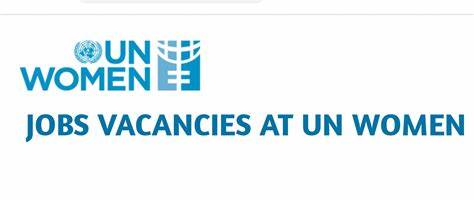Current vacancies
Please follow application instructions carefully and submit a UN Women Personal History Form (P11) as part of the application when specifically noted in the vacancy announcement.
Work and priorities
UN Women is the United Nations entity dedicated to gender equality and the empowerment of women. A global champion for women and girls, UN Women was established to accelerate progress on meeting their needs worldwide.
UN Women supports UN Member States as they set global standards for achieving gender equality, and works with governments and civil society to design laws, policies, programmes and services needed to ensure that the standards are effectively implemented and truly benefit women and girls worldwide. It works globally to make the vision of the Sustainable Development Goals a reality for women and girls and stands behind women’s equal participation in all aspects of life, focusing on four strategic priorities:
- Women lead, participate in and benefit equally from governance systems
- Women have income security, decent work and economic autonomy
- All women and girls live a life free from all forms of violence
- Women and girls contribute to and have greater influence in building sustainable peace and resilience, and benefit equally from the prevention of natural disasters and conflicts and humanitarian action
UN Women also coordinates and promotes the UN system’s work in advancing gender equality, and in all deliberations and agreements linked to the 2030 Agenda. The entity works to position gender equality as fundamental to the Sustainable Development Goals, and a more inclusive world.
Status of women
Gender equality is not only a basic human right, but its achievement has enormous socio-economic ramifications. Empowering women fuels thriving economies, spurring productivity and growth. Yet gender inequalities remain deeply entrenched in every society. Women lack access to decent work and face occupational segregation and gender wage gaps. They are too often denied access to basic education and health care. Women in all parts of the world suffer violence and discrimination. They are under-represented in political and economic decision-making processes.
Over many decades, the United Nations has made significant progress in advancing gender equality, including through landmark agreements such as the Beijing Declaration and Platform for Action and the Convention on the Elimination of All Forms of Discrimination against Women (CEDAW).
Working for the empowerment and rights of women and girls globally, UN Women’s main roles are:
- To support inter-governmental bodies, such as the Commission on the Status of Women, in their formulation of policies, global standards and norms.
- To help Member States implement these standards, standing ready to provide suitable technical and financial support to those countries that request it, and to forge effective partnerships with civil society.
- To lead and coordinate the UN system’s work on gender equality, as well as promote accountability, including through regular monitoring of system-wide progress.
Historical perspective
For many years, the United Nations faced serious challenges in its efforts to promote gender equality globally, including inadequate funding and no single recognized driver to direct UN activities on gender equality issues. In July 2010, the United Nations General Assembly created UN Women, the United Nations Entity for Gender Equality and the Empowerment of Women, to address such challenges. In doing so, UN Member States took an historic step in accelerating the Organization’s goals on gender equality and the empowerment of women. The creation of UN Women came about as part of the UN reform agenda, bringing together resources and mandates for greater impact. It merges and builds on the important work of four previously distinct parts of the UN system, which focused exclusively on gender equality and women’s empowerment:
- Division for the Advancement of Women (DAW)
- International Research and Training Institute for the Advancement of Women (INSTRAW)
- Office of the Special Adviser on Gender Issues and Advancement of Women (OSAGI)
- United Nations Development Fund for Women (UNIFEM)
APPLY HERE
